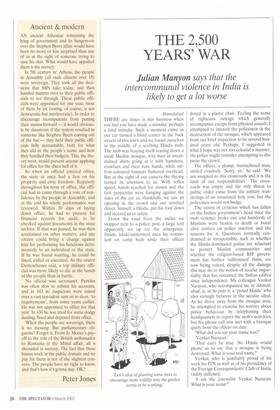Ancient & modern
AN ancient Athenian witnessing the lying of government and its hangers-on over the Stephen Byers affair would have been no more or less surprised than any of us at the sight of someone hying to save his skin. What would have appalled them is the secrecy.
In 5th century BC Athens, the people in Assembly (all male citizens over 18) were sovereign. They took all the decisions that MPs take today, and then handed matters over to their public officials to see through. These public officials were appointed for one year, most of them by lot (voting, of course, is not democratic but meritoeratic). In order to discourage incompetents from putting their names forward — it would obviously be disastrous if the system resulted in someone like Stephen Byers coming out of the hat — they held their public officials fully accountable, both for what they did in the people's name and how they handled their budgets. This, the theory went, would prevent anyone applying for office for the sheer hell of it.
So when an official entered office, the state at once had a lien on his property and civic freedom. Regularly throughout his term of office, the official had to come through a vote of confidence by the people in Assembly, and at the end his whole performance was reviewed. Within 30 days of laying down office, he had to present his financial records for audit, to be checked against documents in the state archive. If that was passed, he was then scrutinised on other matters, and any citizen could bring a charge against him for performing his functions detrimentally to an individual or the state. If he was found wanting, he could be fined, exiled or executed. As the orator Demosthenes said, a top military official was more likely to die at the hands of the people than in battle.
No official was sacrosanct. Pericles was often slow to submit his accounts, and in 443 BC suspicions were raised over a vast ten-talent sum eis to deon, 'to requirements', from some years earlier. He was not appointed to office for that year. In 430 he was tried for some dodgy dealing, fined and deposed from office.
When the people are sovereign, there is no messing. But parliamentary oligarchs? Forget it. From Jo Moore's payoff to the role of the British ambassador to Romania in the Mittal affair, all is shrouded in secrecy. The fact that these brutes work in the public domain and we pay for them is not of the slightest concern. The people have no right to know, and that's how it's gonna stay. OK?














































































 Previous page
Previous page